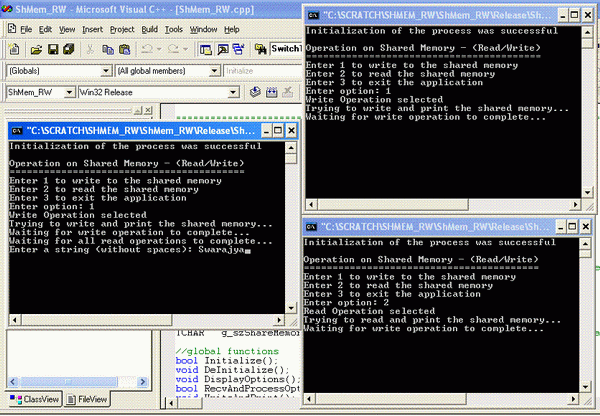
Introduction
This source code demonstrates how to use Win32 events to solve the multiple readers and writers problem. On compilation of this source code, you will get a console application that can act as both a reader and a writer of the shared memory. Multiple instances of the same executable should be executed for testing. Only one write operation is allowed at a time. If there is already a write operation going on, all other write and read operations will get blocked. However, multiple read operations are allowed. If read operations are underway, a write operation will wait for all read operations to get over before proceeding. This synchronization mechanism ensures proper synchronization of readers and writers, and helps in prevention of data corruption at all times.

Background
I was asked to design a solution for the multiple readers and writers problem, in a recent interview. I described at an abstract level what I had in mind. But the more that I thought on this, the more I was convinced that I should implement it to flesh out the ideas that I had in mind. Hence, this source code.

Using the code
This source code has a shared memory which the readers and writers are trying to use. The synchronization is done using events. I have tried to add comments at the right places to make understanding of this source code easier.
Although, this code is in C++, it can easily be converted to C. This program doesn't use any object oriented concept or design.
The code includes <tchar.h> and uses generic functions at many places. However, this code was compiled and tested with ASCII builds only. The code may not compile or work for Unicode builds.
Following is the initialization function which initializes the events and the shared memory:
bool Initialize()
{
for (int ii = 0; ii < MAX_READ_PROCESSES_ALLOWED; ii++)
{
g_hReadEvent[ii] = NULL;
}
TCHAR szBuffer[32];
for (ii = 0; ii < MAX_READ_PROCESSES_ALLOWED; ii++)
{
_stprintf(szBuffer, _T("%s %d"),
g_szReadEventName, ii);
g_hReadEvent[ii] = CreateEvent(
NULL,
false,
true,
szBuffer);
if (NULL == g_hReadEvent[ii])
{
return false;
}
}
g_hWriteEvent = CreateEvent(
NULL,
false,
true,
g_szWriteEventName);
if (NULL == g_hWriteEvent)
{
return false;
}
g_hSharedMemory = CreateFileMapping(
INVALID_HANDLE_VALUE,
NULL,
PAGE_READWRITE,
0,
MAX_SH_MEM_SIZE,
g_szShareMemoryName);
if (NULL == g_hSharedMemory ||
INVALID_HANDLE_VALUE == g_hSharedMemory)
{
cout << "Error occured while"
" creating file mapping object :"
<< GetLastError() << "\n";
return false;
}
g_pBuffer =
(LPTSTR) MapViewOfFile(g_hSharedMemory,
FILE_MAP_ALL_ACCESS,
0,
0,
MAX_SH_MEM_SIZE);
if (NULL == g_pBuffer)
{
cout << "Error occured while mapping"
" view of the file :" << GetLastError()
<< "\n";
return false;
}
return true;
}
Following is the read function which blocks itself on write and read events:
void ReadAndPrint()
{
cout << "Trying to read and print the shared memory...\n";
bool bContinue = true;
while(bContinue)
{
cout << "Waiting for write operation to complete...\n";
DWORD dwWaitResult = WaitForSingleObject(g_hWriteEvent, INFINITE );
if (WAIT_OBJECT_0 == dwWaitResult)
{
bool bEventFound = false;
for (int ii = 0; ii < MAX_READ_PROCESSES_ALLOWED; ii++)
{
DWORD dwWaitResult =
WaitForSingleObject(g_hReadEvent[ii], WAIT_TIME_OUT);
if (WAIT_OBJECT_0 == dwWaitResult)
{
bEventFound = true;
cout << "Setting the Write Event...\n";
SetEvent(g_hWriteEvent);
cout << "Shared Memory: "
<< g_pBuffer << "\n";
cout << "Setting the Read Event...\n";
SetEvent(g_hReadEvent[ii]);
bContinue = false;
break;
}
else
{
continue;
}
}
if (false == bEventFound)
{
cout << "Setting the Write Event...\n";
SetEvent(g_hWriteEvent);
Sleep(WAIT_TIME_OUT);
}
}
else
{
cout << "Error occured while waiting :"
<< GetLastError() << "\n";
}
}
}
Similarly, the write function uses events to synchronize:
void WriteAndPrint()
{
cout << "Trying to write and print the shared memory...\n";
cout << "Waiting for write operation to complete...\n";
if (WAIT_OBJECT_0 == WaitForSingleObject(g_hWriteEvent, INFINITE ))
{
cout << "Waiting for all read operations to complete...\n";
DWORD dwWaitResult = WaitForMultipleObjects(
MAX_READ_PROCESSES_ALLOWED,
g_hReadEvent,
TRUE,
INFINITE);
if (WAIT_OBJECT_0 == dwWaitResult)
{
cout << "Enter a string (without spaces): ";
cin >> g_pBuffer;
cout << "Shared Memory: " << g_pBuffer << "\n";
}
else
{
cout << "Error occured while waiting :"
<< GetLastError() << "\n";
}
cout << "Setting the Write Event...\n";
SetEvent(g_hWriteEvent);
cout << "Setting the Read Events...\n";
for (int ii = 0; ii < MAX_READ_PROCESSES_ALLOWED; ii++)
{
SetEvent(g_hReadEvent[ii]);
}
}
else
{
cout << "Error occured while waiting :"
<< GetLastError() << "\n";
}
}
The de-initialization function is shown next. This function takes care of the de-initialization of the shared memory and events.
void DeInitialize()
{
for (int ii = 0; ii < MAX_READ_PROCESSES_ALLOWED; ii++)
{
CloseHandle(g_hReadEvent[ii]);
}
CloseHandle(g_hWriteEvent);
UnmapViewOfFile(g_pBuffer);
CloseHandle(g_hSharedMemory);
}
Points of Interest
If you are a newbie to events, make sure you understand the difference between manual and auto-reset events. I have used auto-reset events, they are very handy to use.
History
- Feb 2nd 2006 - Removed a wrong statement -
CloseHandle(g_hReadEvent); from Initialize().
This member has not yet provided a Biography. Assume it's interesting and varied, and probably something to do with programming.
 General
General  News
News  Suggestion
Suggestion  Question
Question  Bug
Bug  Answer
Answer  Joke
Joke  Praise
Praise  Rant
Rant  Admin
Admin 







